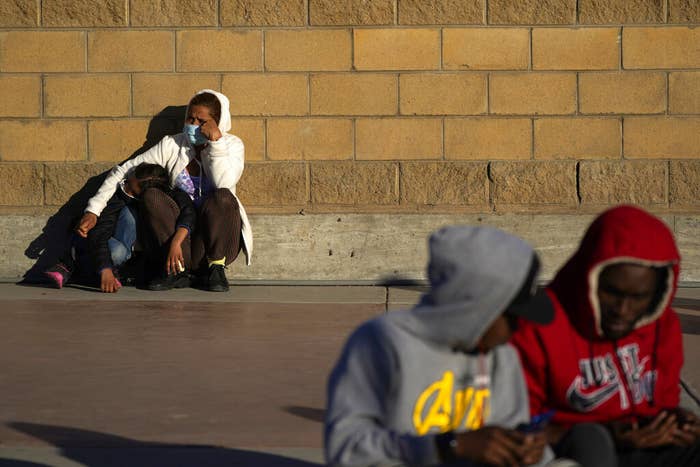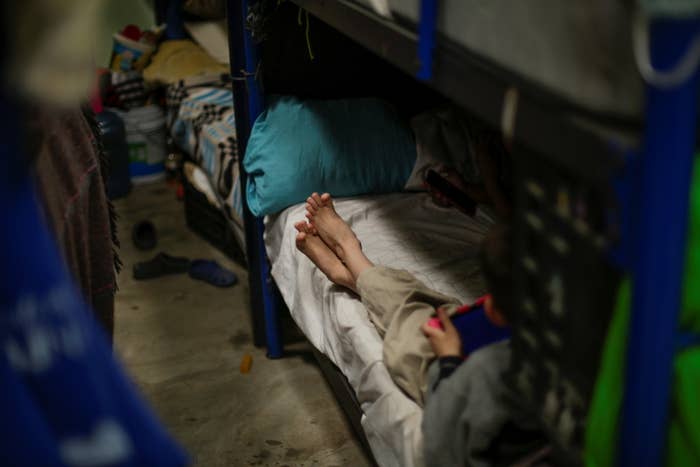
After being forced to wait in dangerous Mexican border towns since 2019, Frank finally got the call he and his wife had been anxiously waiting for; in a few days, a UN official said, they’d receive a second call with a time to arrive and be processed into the US.
But that call never came. And then a few days later, someone on a WhatsApp group of Cuban asylum-seekers shared an article about how the Supreme Court had refused to block a requirement that the US restart a Trump-era program that forced thousands like Frank and his wife to wait in Mexico until a decision on their case was made.
"My wife fell to the floor in tears," said the 32-year-old, who declined to use his full name out of fear of government scrutiny. "One day we were waiting on the call to enter the US, and the next we don't know if we will ever be allowed in."
More than 70,000 immigrants and asylum-seekers were sent back to Mexico under what’s officially called the Migrant Protection Protocols (MPP) and unofficially known as the “Remain in Mexico” program, where they have little access to legal aid and live with the constant threat of violence from cartel members. Now, until the Biden White House resolves the recent court action, thousands of immigrants like Frank will be back to square one.
The Biden administration's recent troubles in ending the Remain in Mexico policy stem from a district judge's order that it be reinstated on Aug. 13. The Supreme Court refused to block the order after the administration appealed, forcing the government to restart it. This week, Homeland Security Secretary Alejandro Mayorkas told CBS Evening News that while he opposed the Trump-era program, he was "obliged" to revive it due to the federal court order.
This summer, Biden fulfilled a campaign promise and formally ended Remain in Mexico. And, as part of a second phase, the US was allowing in people like Frank, who had been ordered deported in absentia after failing to attend his MPP court hearings.
But Christopher Boian, a spokesperson for United Nations High Commissioner for Refugees, said that the organization was waiting for confirmation from the US on how the court ruling will affect people with in absentia orders.
In a statement to BuzzFeed News, the Department of Homeland Security said that as long as the lower court’s injunction remains in effect, it and its partners will suspend efforts to process immigrants who were previously enrolled in MPP.
DHS added that it was working on a way to accommodate those who were enrolled in MPP under the previous administration, are still outside the US, and have active immigration proceedings.
For immigrants who had been ordered to be deported after not attending their hearings — sometimes because they were a victim of a crime in Mexico — the US went through a labor-intensive process to reopen their cases.
ICE prosecutors were also told in late August in an email that they must suspend “any and all processes” related to winding down the program.
Asylum officers received an email in late August as well, saying the agency was taking steps to reimplement and enforce MPP in good faith. The email also said DHS was working with the State Department and the Mexican government to ensure the “expeditious reimplementation” of the Remain in Mexico program.
But the email from Andrew Davidson, head of asylum at the US Citizenship and Immigration Services, also said restarting the program would depend on Mexico and the return of the necessary infrastructure to handle the cases.
Staffers were also told that the agency should “cease all activities” at ports of entry related to processing people who were previously enrolled in MPP.

Some immigrants missed their court hearings because they were kidnapped or targeted by criminals. From February 2019 to February 2021, Human Rights First counted at least 1,544 public reports of murder, rape, and other attacks committed against people in MPP.
Frank and his wife missed their hearing because of a shootout that occurred outside their apartment in Ciudad Juárez. They were already running late because Frank's wife was sick, but the shooting all but ensured they would miss their appointment.
Life in Mexico isn't easy for immigrants. Not only are asylum-seekers under a constant threat of violence, but neither employers nor rental property owners want them.
Two months ago, a group of men assaulted Frank at a stoplight, stealing the bike he used to get to work. He used to have a job at a US-operated factory in Mexico, where he assembled pieces for heaters. Now he’s a repairperson, but jobs are inconsistent and he barely makes enough for rent and food.
Frank also has a fear of being kidnapped and doesn't leave his apartment unless he has to. All immigrants and asylum-seekers run the risk of being kidnapped, but criminals sometimes target Cubans because their families are more likely to be established in the US and have more money.
"Here in Mexico, they call us ATM machines," Frank said. "It hasn't been easy living here, and I'm begging the US to at least let those of us with open cases enter the country. I don't know how much longer we can wait."

